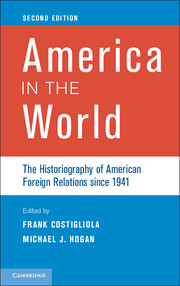Book contents
- Frontmatter
- Dedication
- Contents
- List of Contributors
- Preface
- 1 Introduction
- 2 The Charlie Maier Scare and the Historiography of American Foreign Relations, 1959–1980
- 3 Chaps Having Flaps: The Historiography of U.S. Foreign Relations, 1980–1995
- 4 Still Contested and Colonized Ground: Post–Cold War Interpretations of U.S. Foreign Relations during World War II
- 5 Recent Literature on Truman’s Atomic Bomb Decision
- 6 The Cold War
- 7 Cold War Presidents: Dwight D. Eisenhower, John F. Kennedy, Lyndon Baines Johnson, and Richard M. Nixon
- 8 The War that Never Ends: Historians and the Vietnam War
- 9 Culture and the Cold War: U.S.–Latin American Historiography since 1995
- 10 Impatient Crusaders: The Making of America’s Informal Empire in the Middle East
- 11 Explaining the Rise to Global Power
- 12 Bringing the Non-State Back In
- 13 Technology and the Environment in the Global Economy
- 14 U.S. Mass Consumerism in Transnational Perspective
- 15 A Worldly Tale
- Index
- References
3 - Chaps Having Flaps: The Historiography of U.S. Foreign Relations, 1980–1995
Published online by Cambridge University Press: 05 June 2014
- Frontmatter
- Dedication
- Contents
- List of Contributors
- Preface
- 1 Introduction
- 2 The Charlie Maier Scare and the Historiography of American Foreign Relations, 1959–1980
- 3 Chaps Having Flaps: The Historiography of U.S. Foreign Relations, 1980–1995
- 4 Still Contested and Colonized Ground: Post–Cold War Interpretations of U.S. Foreign Relations during World War II
- 5 Recent Literature on Truman’s Atomic Bomb Decision
- 6 The Cold War
- 7 Cold War Presidents: Dwight D. Eisenhower, John F. Kennedy, Lyndon Baines Johnson, and Richard M. Nixon
- 8 The War that Never Ends: Historians and the Vietnam War
- 9 Culture and the Cold War: U.S.–Latin American Historiography since 1995
- 10 Impatient Crusaders: The Making of America’s Informal Empire in the Middle East
- 11 Explaining the Rise to Global Power
- 12 Bringing the Non-State Back In
- 13 Technology and the Environment in the Global Economy
- 14 U.S. Mass Consumerism in Transnational Perspective
- 15 A Worldly Tale
- Index
- References
Summary
The original edition of America in the World, edited by Michael J. Hogan and published in 1995, began with a brief introduction by Hogan, then followed with essays and responses to them by three of the field’s leading scholars: Bruce Cumings, Melvyn P. Leffler, and Michael H. Hunt. These entries, according to Hogan, were to assess the “state of the art” in the field, “to make ... a large statement about the ... field as a whole” (xii), sounding themes and spotting trends, and thus preparing the ground for the region- or topic-specific chapters that followed. The three could then have at each other in their responses, as indeed they did. The Cumings essay was derived from an article published previously in the journal Diplomatic History, Leffler’s was an expanded version of the presidential address he made to his colleagues in the Society for Historians of American Foreign Relations (SHAFR) in early 1995, and Hunt’s essay, like Leffler’s, was originally published in Diplomatic History. Taken together, and reconsidered more than fifteen years after their publication, the essays and the comments that followed them provide insights – some intended by their authors, some not – into the state of play in the field of U.S. foreign relations history circa 1995, and with special reference, if not exclusive attention, to the historiography since 1980.
- Type
- Chapter
- Information
- America in the WorldThe Historiography of American Foreign Relations since 1941, pp. 30 - 56Publisher: Cambridge University PressPrint publication year: 2013



